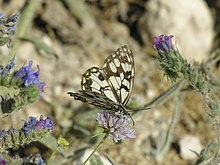
The dusky large blue is a species of butterfly in the family Lycaenidae. It is found in Armenia, Austria, Azerbaijan, Belarus, Bulgaria, Czech Republic, France, Georgia, Germany, Hungary, Kazakhstan, Moldova, Montenegro, the Netherlands, Poland, Romania, Russia, Slovenia, Spain, Switzerland, and Ukraine.

Erebia epistygne, the spring ringlet, is a species of butterfly in the family Nymphalidae. It is found in France and Spain. Its natural habitat is temperate grassland.

The Piedmont ringlet is a member of the family Nymphalidae. It is an Alpine butterfly.

The bright eyed ringlet is a member of the Satyridae subfamily of Nymphalidae. It is a high mountain butterfly found in the Pyrenees, Massif Central, Alps and Balkan mountains. It has recently been confirmed to occur in the southern chain of the Carpathians.
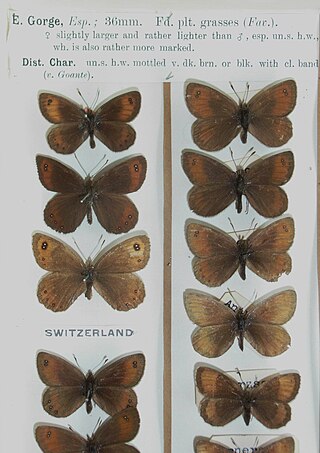
The silky ringlet is a member of the subfamily Satyrinae of the family Nymphalidae. It is a high-altitude butterfly found on screes in the Alps, Pyrenees, central Italy and the Balkans. It is a very variable butterfly.

The de Prunner's ringlet is a member of the subfamily Satyrinae of the family Nymphalidae.

The black ringlet is a member of the subfamily Satyrinae of the family Nymphalidae. It is a high-altitude butterfly found in Albania, former Yugoslavia, Bulgaria, Greece, and Romania.
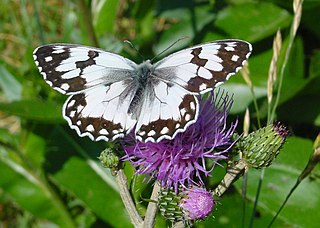
Melanargia lachesis, the Iberian marbled white, is a butterfly species belonging to the family Nymphalidae.

Glaucopsyche alexis, the green-underside blue, is a butterfly of the family Lycaenidae. It is found in the Palearctic.

Glaucopsyche melanops, the black-eyed blue, is a butterfly of the family Lycaenidae. It is found in the western part of Southern Europe and North Africa.

Agriades optilete, the cranberry blue, is a butterfly of the family Lycaenidae. It is found in north eastern Europe, the Alps, North Asia, Japan, Korea and north western North America.

Melanargia occitanica, the western marbled white, is a butterfly species belonging to the family Nymphalidae.

Melanargia russiae, or Esper's marbled white, is a butterfly in the family Nymphalidae. It is found in Spain, Portugal, south-eastern France, Italy, the Balkans, southern Russia, the Caucasus and western Siberia.

Polyommatus (Plebicula) dorylas, the turquoise blue, is a butterfly of the family Lycaenidae. It is found in southern Europe, Asia Minor, the Ural Mountains, Caucasus and Transcaucasia. Its wingspan is 15–17 mm. The butterfly's common name comes from the dazzling bright blue colour of male's wings. The larvae feed on Anthyllis vulneraria. The butterfly flies from May to September in two generations. Habitats include flowery meadows in rocky areas at 500–2000 m.
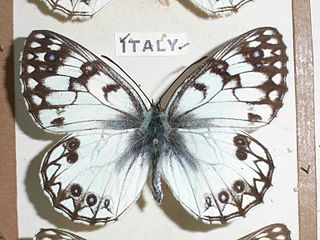
Melanargia arge, the Italian marbled white, is a butterfly of the family Nymphalidae. M. arge Sulz.. Above white, only the submarginal lunate line, the two short bands in the centre and at the apex of the cell, and the beautifully blue-centred ocelli being dark — ab. caeca Stgr. is without ocelli; rare among the preceding. It is an endemic species found only in the southern half of Italy and the eastern half of the Italian island of Sicily. It flies in May and June in a single generation in rocky places with abundant flowers. The caterpillar feeds on grasses.
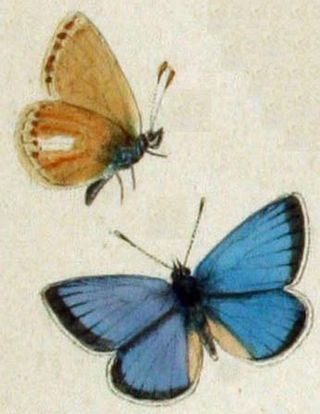
Polyommatus stoliczkanus is a butterfly in the family Lycaenidae. It is found from the western Himalayas to Nepal.

Polyommatus admetus, the anomalous blue, is a butterfly of the family Lycaenidae. It was described by Eugenius Johann Christoph Esper in 1783. It is found in south-eastern Europe and Turkey.
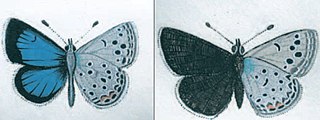
Turanana endymion, the odd-spot blue or Anatolian odd-spot blue, is a butterfly of the family Lycaenidae. It was described by Christian Friedrich Freyer in 1850. It is found in Turkey, Lebanon and Iran. Records from Europe refer to Turanana taygetica.

Melanargia larissa, the Balkan marbled white, is a butterfly in the family Nymphalidae. It is found from south-eastern Europe and Asia Minor to Transcaucasia and north-western Iran. The habitat consists of dry grasslands, scrubby hillsides and grassy woodland glades. Adults are on wing from mid-May to July in one generation per year.
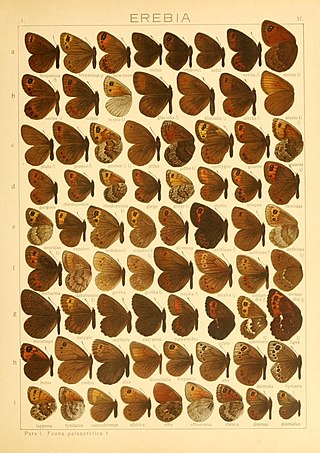
Proterebia afra is a small butterfly found in the Palearctic that belongs to the browns family.
